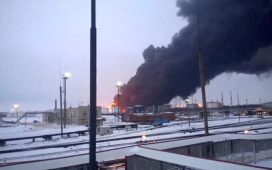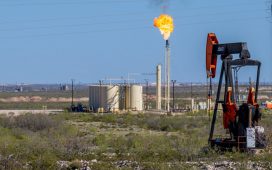
Pope Francis receives a traditional Japanese shirt designed by young Catholic people at St. Mary’s … [+]
Pope Francis, economic strategist? Japanese policymakers are indeed having a come-to-Jesus moment this week following the pontiff’s stated disdain for Tokyo’s favorite energy source.
In visiting Japan, Francis made a point of dropping in on Hiroshima and Nagasaki, two cities devastated by atomic bombs 70-plus years ago. There, he condemned the evils of weapons, calling them “a crime not only against the dignity of human beings but against any possible future for our common home.
What got economists’ attention, though, was the pope’s denunciation of the nuclear power industry and its “selfish decisions,” too. He came perilously close, at least for the pro-reactor crowd, to calling for the abolition of nuclear power.
It’s the last thing host Shinzo Abe wanted to hear from the leader of the world’s roughly 1.2 billion Catholics. Arguably no developed economy has hitched its fortunes more closely to nuclear power than Japan. Since becoming prime minister in 2012, Abe spent vast amounts of time, energy and political capital on restarting reactors shuttered after the Fukushima mess.
To be sure, the pope isn’t shilling for producers of safer renewable energies. Nor is he necessarily speaking the language of job creation and stock valuations. But he reminded Japan it’s squandering a glaringly obvious economic opportunity: becoming the globe’s premier incubator for new energy sources.
Since 2012, Abe has empowered the Bank of Japan to pump trillions of dollars into an aging and uncompetitive economy. The BOJ cornered the bond market and commandeered equities via epic purchases of exchange-traded funds. By the end of 2018, the BOJ’s balance sheet exceeded the size of Japan’s entire $5 trillion economy, a first for a Group of Seven nation.
And yet, wages haven’t snapped back as hoped. The virtuous cycle Abe promised hasn’t arrived. The reason: Tokyo has been engaging more in trickle-down economics than the deregulatory reform Japan needs. This dearth of audacity saw Abe’s Liberal Democratic Party circling the wagons to protect the primacy of nuclear power.

Pope Francis walks with Japan’s Prime Minister Shinzo Abe as he arrives at the prime minister’s … [+]
In doing so, Tokyo is missing out on an economic boom that’s Japan’s for the taking. No industry promises greater spoils than devising ways for China, India, Indonesia and other emerging powerhouses to avoid choking on rapid gross domestic power growth.
Japan is ideally situated to lead this boom. As U.S. President Donald Trump makes coal great again, he’s effectively sidelining the world’s biggest economy. China’s sustainability push certainly shows promise, particularly as President Xi Jinping invests big in his “Made in China” gambit. Yet Japan’s storied past in the realm of battery innovation has never been more relevant.
When Tesla billionaire Elon Musk set up his $5 billion lithium-ion gigafactory in Nevada in 2014, his first call was to battery pioneer Panasonic. SoftBank billionaire Masayoshi Son, meantime, has been angling to revolutionize Japan’s energy mix with vast solar farms and other new technologies.
If only Abe’s government would lend the effort a hand. Japan’s “nuclear village” still holds great sway over the LDP, which has ruled Japan with only two short interruptions since 1955. This nexus of pro-reactor lawmakers, business titans, academics and investors is Japan’s answer to the military-industrial complex that so warps Washington policymaking.
The pope’s broadside must have the nuclear village squirming. Did Francis just give Abe’s new environment minister, Shinjiro Koizumi, an opening to alter Tokyo’s energy trajectory?
Abe tapped the youthful Koizumi in September, hoping his star power might help his cabinet’s flagging support rates. Koizumi is the son of former Prime Minister Junichiro Koizumi, who since stepping down in 2006 has found religion on nuclear power. Like his father, Koizumi Jr. favors transitioning away from reactors.
Safety is one reason. The Fukushima meltdown was precipitated by an earthquake. Japan, of course, is one of the globe’s most seismically-active places—and all too susceptible to further such crises. It’s also about creating jobs and raising Japan’s economic footprint globally.
And doing it right. Unfortunately, Abe’s government is focused on selling nuclear technology around the globe on behalf of Japan Inc. Often to other seismically vulnerable nations like India and Turkey.
Morphing Japan into the world’s laboratory for replacing fossil fuels once and for all would create new economic growth and wealth, all while raising Japan’s global clout. Tokyo hasn’t got a prayer of doing any of things by pumping more liquidity into an economy with few productive uses for it.
The pope may not be an economist. But, inadvertently or not, he sure did spotlight where Abe’s Japan should be pivoting–away from nuclear power and toward the innovative light.








